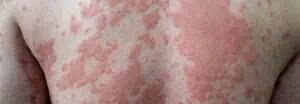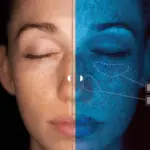Patch Testing for Allergies
Home » Treatments » Patch Testing for Allergies
Allergies Should not control your life
Not sure about your allergy? Get in touch now, there is no reason for you to wait.
Award winning dermatology service, with over 20 years of experience
Short waiting lists, on some occasions offering same week appointments
Safe environment, in Care Quality Commission approved facilities
ALLERGY PATCH TESTING IN LONDON
Our patch testing facility is a specialist unit designed to determine if there is an allergic contact cause for your skin allergy. In addition to patch testing, we can offer a full spectrum of blood allergy testing to see if there is an allergic component driving your skin disease.
Our patch testing service is run by our team of highly qualified dermatology specialist nurses and physicians assistant with many years of cumulative experience in providing patch tests for skin patients. Our clinic is very happy to see any patient who has been referred by a consultant dermatologist (UK registered). If you have not seen a dermatologist and worried about contact allergy, then please book to see one of our consultants and we can facilitate your testing, investigation and treatment.
Remember, there is currently no test on the market other than a patch test that is able to identify a contact allergy. Blood tests are available for allergies, but these tend to be to identify inhaled, airborne or ingested allergens, not contact allergens.
WHAT IS ALLERGY PATCH TESTING?
Patch testing is undertaken to try and identify if there are any substances which are causing or aggravating your rash by coming into contact with your skin
Patch testing involves having sticky patches stuck to your back (or sometimes to other areas of non-affected skin like arms or legs). Underneath the patches, small compartments hold common household chemicals pressed tightly against your skin. Examples of these include fragrances, colouring, preservatives found in creams, hair dye, metals et cetera. These are all common chemicals found in every day life and none is toxic.
Patch test can check for between 20 and 70 allergens at any one time.
The testing requires THREE visits to the clinic over a five or six day period:
- The patches are applied and the areas marked with ink
- 48 hours later the patches are removed, readings taken and the areas further re-marked with ink
- A further 48 to 72 hours later, final reading is undertaken
YOUR 1ST PATCH TEST VISIT
Make sure that your back is clean, free of hair and that no moisturisers have been applied.
The patches will be put onto your upper back, and possibly arms or thighs, in the form of small discs on hypoallergenic tape and the skin will be marked with ink. The patches stay in place for 48 hours. If one of the patches becomes loose, please tape it back down. Itching of the patch test sites is normal and you may find your back movements feel a little restricted. If you have an allergy to one or more of the substances, it will show up on your back even if the rash is elsewhere on your body. Once the patch tests have been applied you must keep your back dry of water and sweat until after the final appointment.
YOUR 2ND PATCH TEST VISIT
The patch tests will be removed from your back after 2 days and a reading will be made to assess whether you have had any early positive reactions. We will mark the back with ink and may leave a strip of tape on your back to help us identify any further reactions at your final appointment. It is important that you continue to avoid getting your back wet as the markings need to remain on your skin.
YOUR 3RD PATCH TEST VISIT
The final patch test reading takes place between 5 -7 days after their initial application. Your consultant will discuss the results with you and give you more information about any of the substances you have reacted to which may help you to avoid contact with such allergens in the future.
FREQUENTLY ASKED QUESTIONS
WHAT ARE THE “DOS AND DON’TS” DURING PATCH TESTING
Keeping the patches dry is the most important aspect of accurate patch testing.
Water or moisture of any description will often cause the allergens to dissolve out of their chambers and often make results difficult to interpret.
For the whole 4 to 5-day testing period whilst the patch tests and ink markings are on your skin:
Don’t:
- Get the patches or markings wet in the bath or shower
- Work up a sweat by exercising too hard
- Go swimming
- Wear pale or valuable clothing as the ink may stain it
- Expose yourself to sunlight
- Take immunosuppressive medications (If you already taking these, patch testing is not likely possible as the results will be suppressed)
If the area becomes itchy, try not to scratch.
Do:
- Use the shower cautiously and attempt to sponge wash yourself whilst keeping the patches/markings out of the water flow
- Shower on the morning before your patch test (as you won’t be able to have a proper shower for at least a further 96 hours)
- Enjoy a holiday from exercise or sport that causes you to sweat
- If you notice a patch coming away, try to tape it down yourself
- Contact the clinic if you have questions or concerns
- Remember, these restrictions and recommendations need to cover the entire period from the first visit right through to the last, or the results may be invalidated
ARE THERE ANY SIDE EFFECTS OF PATCH TESTING?
If you have a positive allergy, the biggest side-effect people suffer with will be itching. Sometimes you can also get an irritant reaction under the tape and this is also itchy.
- Occasionally reactions can become red, swollen or even blistered
- In strong positive allergies persistent reactions may occur which take a few weeks to disappear
- Eczema may flare up in the presence of positive patch test
- Inflammation can cause pigment change which may lighten or darken and sometimes lasts for a few months but is rarely permanent
IS THERE ANYONE WHO CAN'T HAVE PATCH TESTING?
Patch testing is not advisable if you:
• are pregnant or breastfeeding
• have extensive eczema on your back
• have been exposed to the sun or have used a sun bed over the previous 2 weeks
• have recently applied an artificial tan
• are using moderate or high dose oral steroids
It is not possible to apply test patches if the skin on your back is scratched, sun burnt, has a rash or excessive hair growth. If you do have excessive hair on your back, please have the area shaved before your appointment.
Avoid using antihistamines for 48 hours before and during the patch testing period as this would reduce any visible reaction to the allergens.
HEAR FROM OUR PATIENTS
Start Your Journey With Us
Please fill in this form and one of our team will give you a call back to arrange a consultation with one of our expert dermatologists.
WHY GET PATCH TESTING FOR ALLERGIES DONE AT THE HARLEY STREET DERMATOLOGY CLINIC?
Having the right dermatologist is important especially when you have a chronic skin condition that will require ongoing treatment. We want you to feel confident that we’re providing you with the best possible care. We also want you to feel as comfortable as possible with your dermatologist.
The Harley Street Dermatology Clinic specialises in conditions affecting the skin, hair and nails. Our goal is to provide all the care that you need when you’re experiencing these kinds of problems. We want to make it easy for you to access the best quality treatment and support in London.
The clinic is conveniently located in Central London, so it’s easy to visit us if you need to see a dermatologist. You will find yourself in a very comfortable and welcoming environment. We have created a relaxing space where you will receive the highest quality of care. We are regulated by the Care Quality Commission, are part of the British Association of Dermatologists and are top rated by patients of Doctify so you can be sure of safe and effective treatment with us.
latest INSIGHTS AND ADVICE

Combat Common Autumn Skin Conditions for Healthier Skin
Autumn is a time when the world transforms. Leaves turn brilliant shades of red and gold, temperatures drop and the air becomes crisp. While this season offers a picturesque backdrop, it also presents unique challenges for our skin. For skincare lovers and beauty enthusiasts, adapting

Eczema Awareness Month – A Guide to Understanding and Managing Your Skin
Eczema Awareness Month is a dedicated time to shine a light on a condition that affects millions worldwide. If you’re one of the many eczema sufferers, you’re likely familiar with the challenges of managing this skin condition. October aims to educate, support and empower those

Psoriasis Awareness Month: Awareness, Treatments and Support
Understanding Psoriasis Awareness Month Every year, Psoriasis Awareness Month is celebrated in August. It’s a time dedicated to educating people about psoriasis, a chronic skin condition that affects millions worldwide. This awareness campaign aims to reduce the stigma associated with psoriasis, encourage early detection and









